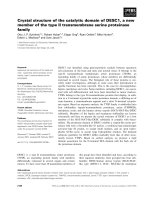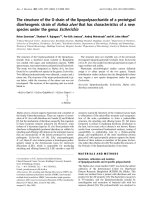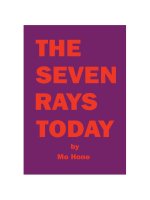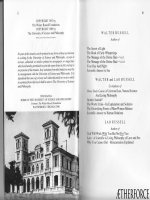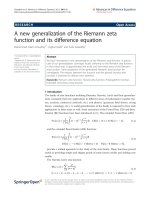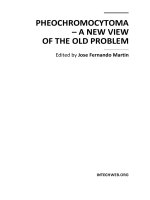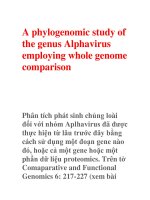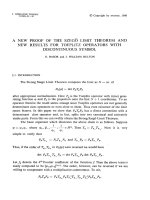A new species of the genus Trigonura Sichel, 1865 (Hymenoptera: Chalcididae) from Vietnam
Bạn đang xem bản rút gọn của tài liệu. Xem và tải ngay bản đầy đủ của tài liệu tại đây (626.52 KB, 6 trang )
TAP CHI SINH HOC 2019, 41(4): 1–6
DOI: 10.15625/0866-7160/v41n4.14030
A NEW SPECIES OF THE GENUS Trigonura Sichel, 1865
(Hymenoptera: Chalcididae) FROM VIETNAM
Khuat Dang Long*, Nguyen Duc Hiep, Dang Thi Hoa, Tran Thi Ngat
Institute of Ecology and Biological Resources, VAST, Vietnam
Received 26 July 2019, accepted 2 October 2019
ABSTRACT
Based on the specimens of chalcid parasitoid wasps collected by malaise traps set in fruit
orchards in the adjacent area of Ha Noi city from 2018–2019, one new species of the genus
Trigonura, T. vietnamica Long, sp. n., was described and illustrated. Two species of this genus
from Vietnam are keyed, the comparative characters of the new species were also given to
compare with two similar species from the Oriental Region, T. indica Narendran and T.
luzonensis Narendran.
Keywords: Chalcididae, Trigonura, new species, parasitoid wasps, Oriental, Vietnam.
Citation: Khuat Dang Long, Nguyen Duc Hiep, Dang Thi Hoa, Tran Thi Ngat, 2019. A new species of the genus
Trigonura Sichel, 1865 (Hymenoptera: Chalcididae) from Vietnam. Tap chi Sinh hoc (Journal of Biology), 41(4): 1–
6. />*
Corresponding author email:
©2019 Vietnam Academy of Science and Technology (VAST)
1
Khuat Dang Long et al.
INTRODUCTION
The family Chalcididae Latreille, 1817
(Hymenoptera: Chalcidoidea), a moderatesized family within
the Chalcidoidea,
is
apparently polyphyletic, though the different
subfamilies. The family composed mostly
of parasitoids and few hyperparasitoids. As
presently defined, there are about 90 valid
genera and approximately 1500 valid species
so far described from the world (Noyes, 2011;
Narendran & van Achterberg, 2016). The
genus Trigonura Sichel, 1865 is one of the
moderately diverse genus among the family
Chalcididae, and up to date, the genus
comprises twenty nine valid species, of those
eleven species were reported from the
Oriental region. The Chalcididae of Vietnam
was revised by Narendran & van Achterberg
(2016) with 16 genera and 68 species
reported, and in this work there was one
species, Trigonura luzonensis Narendran,
1987, was recorded from Vietnam. In this
paper we aim to report the discovery of
another one new species of the genus
Trigonura Sichel, 1865 from Vietnam.
MATERIALS AND METHODS
This study is based on the chalcid wasp
specimens captured by malaise traps set in
fruit orchards in the surrounding areas of Ha
Noi city from 2018 through 2019. All the
specimens, including types are deposited in
the Parasitic Hymenoptera Collection at the
Institute of Ecology and Biological Resources
(IEBR), Vietnam Academy of Science and
Technology (VAST), Ha Noi, Vietnam.
Terminology used in this paper follows
Narendran & van Achterberg (2016). For
identification of the genera of the subfamily
Chalcididae, see Narendran & van Achterberg
(2016). For virtually all species we used an
Olympus® SZ61 binocular microscope; key to
species and description of species are based
on female; measurements were carried out
using an Olympus® SZ40 binocular
microscope; The colour photographs were
made with Sony® 5000 digital camera
attached to a Nikon® SMZ 800N binocular
microscope connected to a PC at IEBR. The
2
scale-lines of the plates indicate in mm.
Abbreviations used in this paper are as
follows: POL = postocellar line; OOL =
ocular-ocellar line; OD = diameter of
posterior ocellus; MT: Malaise trap;
“Chalcid.+number’: code number indexing for
specimens of the Chalcididae in the collection
at IEBR; N = North, STCT = Department of
Insect Ecology. All types of the new species
are deposited in IEBR (Ha Noi, Vietnam).
RESULTS
SYSTEMATICS
Trigonura Sichel, 1865
Trigonura Sichel, 1865: 358, 376–377 (as
subgenus of Phasganophora Sichel, 1865).
Type
species:
Phasganophora
crassicauda Sichel, by monotypy.
Bactrochalcis Kieffer, 1912: 463. Type
species: Bactrochalcis reticulata Kieffer, by
monotypy. Synonymised with Trigonura
Sichel by Steffan (1951b).
Centrochalcis Cameron, 1913: 92. Type
species: Centrochalcis ruficaudis Cameron,
by monotypy. Synonymised with Trigonura
Sichel by Waterston (1922).
Centrochalcidea Gahan & Fagan, 1923:
28. Replacement name for Centrochalcis
Cameron, 1913, not 1905.
Chalcidellia Girault, 1924a: 1–3. Type
species: Chalcis euthyrrhini Dodd, by original
designation. Synonymised with Trigonura
Sichel by Bouček (1988b).
Urochalcis Nikol’skaya, 1952: 91. Type
species: Urochalcis ninae Nikol’skaya, by
original designation. Synonymised with
Trigonura Sichel by Nikol’skaya (1960).
Checklist and distribution of Trigonura
species of the Oriental region
Trigonura bakeri Masi, 1926/Philippines.
Trigonura gladiator (Walker, 1862)/
Malaysia.
Trigonura indica Narendran, 1987/India.
Trigonura javensis Narendran, 1987/
Indonesia.
A new species of the genus Trigonura
Trigonura luzonensis Narendran, 1987/
India, Philippines, Vietnam.
Trigonura nishidai Narendran, 1989/
China, Laos.
Trigonura samarensis Narendran, 1987/
India, Philippines.
Trigonura shonima Narendran, 1989/
Malaysia.
Trigonura steffani Narendran, 1987/India.
1.
-
Trigonura tenuicaudis Waterston, 1922/
India.
Trigonura
Malaysia.
townesi Narendran,
1989/
Trigonura vietnamica Long, sp. n./
Vietnam.
Key to Vietnamese species of Trigonura
Sichel
In lateral view, scutellum highly convex anteriorly higher upper level of mesoscutum (Fig.
200 in Narendran & van Achterberg, 2016); PMV longer than STV; hind femur and tibia
completely black……………………………….……………T. luzonensis Narendran, 1987
In lateral view, scutellum convex medially, almost at the upper level of mesoscutum (Figs
1, 4); PMV 0.7 × STV (Fig.); hind femur brown, except baso-dorsally and apico-ventrally
redish-yellow; tibia mostly brownish-yellow, infuscate basally.... T. vietnamica Long, sp. n
Description of species
Trigonura vietnamica Long, sp. n. (Figs 1–9)
Material. Holotype, ♀, “Chalcid.0068”
(IEBR), N Vietnam: Ha Noi, Tu Liem, Minh
Khai, fruit orchard, MT, 20o23’N 105o34’E, 8
m, 20–30.iv.2019, STCT. Paratypes, 2 ♀,
“Chalcid.0069”,
“Chalcid.0070” (IEBR),
ibid; paratype, 1 ♀, “Chalcid.0071” (IEBR),
N Vietnam: Ha Noi, Chuong My, Thuy Xuan
Tien, fruit orchard, MT, 20o52’59.7”N
105o34’35.5”E, 11 m, 20–30.iv.2019, STCT.
Diagnosis.
Differences
between
Trigonura vietnamica Long, sp. n. and T.
luzonensis Narendran, 1987, from Philippines
and Vietnam (Narendran & van Achterberg,
2016) are given in the key, the new species
can be distinguished from T. luzonensis by the
following characters: a) POL 2.2 × OOL (2.5–
3.1 × in T. luzonensis); b) PMV distinctly
shorter than STV (slightly longer than STV in
T. luzonensis); c) in lateral view, scutellum
slightly convex, and almost at the same level
of mesoscutum (highly convex above level of
mesoscutum in T. luzonensis); d) T1 1.1 × its
width (T1 shorter than its width in T.
luzonensis); and e) Hind femur dark brown
laterally, yellowish-red baso-laterally and
apico-ventrally (blackish without any yellow
spot in T. luzonensis).
Based on the diagnosis given by
Narendran & van Achterberg (2016), the new
species is close to Trigonura indica
Narendran, 1987, from India, but differs from
the latter by the following characters: a) Hind
femur densely and minutely punctate (in T.
indica the punctures are less close on the hind
femur); and b) Hind femur dark brown
laterally, reddish-yellow baso-laterally and
apico-ventrally (in T. indica hind femur
yellowish-red with a distinct characteristic
yellow spot at the apex).
Description. ♀, length of body 5.7 mm,
fore wing 3.2 mm, antenna 2.5 mm (Fig. 1).
Head. Middle antennal segment 2.0 × as
long as wide (10:5); apical antennal segment
1.7 × as long as subapical segment (12:7); in
dorsal view, POL 2.2 × OOL; POL : OD :
OOL = 13 : 4 : 6 (Fig. 2); face, frons, vertex
and temple foveolate-rugose; area between
scrobes finely transversely strigate-rugose.
Mesosoma. In lateral view, scutellum
slightly convex, almost at the same level of
mesoscutum (Figs 1, 4); pronotum
transversely rugose dorsally, foveolate-rugose
laterally (Fig. 4); mesoscutum foveolatepuncticulate (Fig. 3), except anterior narrow
transverse area of mesoscutum finely costate;
scutellum foveolate-puncticulate; metanotum
and scutellum apically crenulate (Fig. 6);
3
Khuat Dang Long et al.
propodeum areolate (Fig. 6); metapleuron
setose, foveolate-rugose (Fig. 4).
Wings. Length of fore wing 2.1 × as long as
its maximum width (82 : 39); fore wing veins
MV : STV : PMV = 16 : 6 : 4 (Fig. 9); length of
hind wing 4.3 × as long as its maximum width
(56 : 13); hind wing with three hamuli.
Legs. Hind coxa densely setose basoventrally, almost smooth apically; hind
femur with close minute setigerous pits,
outer ventral margin with a row of 10 teeth,
basal tooth distinctly larger than others, and
size of teeth decreasing from base to apex
(Fig. 7).
Figures 1–9. Trigonura vietnamica Long, sp. n. Holotype, female (lateral view) 1. Habitus, 2.
Head dorsal view 3. Mesoscutum 4. Mesopleuron 5. Frons and scrobes 6. Metanotum and
propodeum 7. Hind femur and tibia (lateral view) 8. Metasoma (dorsal view) 9. Fore wing
4
A new species of the genus Trigonura
Metasoma. First metasomal tergite (T1)
1.1 × as long as wide (47:44) (Fig. 8);
dorsally, epipygium long, with dorsal
median carina (Fig. 8), 0.7 × as long as T1
(18 : 26), and 0.3 × as long as length of T1–
T6 (18 : 57).
Colour. Head black; scapus black, except
yellow at extreme base; antennae black; eye
and ocellus eye and ocellus reflecting
whitish-grey; mandible yellow, except its
black tips; pronotum reddish-yellow, black
ventrally;
tegula
yellow;
lobes
of
mesoscutum blackish brown dorsally,
reddish-yellow laterally; scutellum blackish
brown dorsally, reddish-yellow laterally and
apically; metanotum and propodeum black;
fore and middle coxa dark brown to black;
fore and middle femur and tibia yellow, but
yellowish-brown dorsally; fore and middle
tarsus yellow; hind coxa brown, but reddishyellow apico-ventrally; hind femur dark
brown laterally, reddish-yellow basolaterally and apico-ventrally; fore wing veins
pale brown; wing membrance hyaline.
Male. Unknown.
Etymology. The new species is named
after the country, where the holotype was
discovered (Vietnam).
Host. Unknown.
Distribution. N Vietnam: Ha Noi.
DISCUSSION
Recently, in the paper published by
Narendran & van Achterberg (2016), of the
total 68 species belonging to 16 genera
reported, 37 species and 11 genera were new
for Vietnam. Probably this is the first
taxonomical work dealing with chalcid wasps
from Vietnam. Additionally, in the published
paper by Narendran & van Achterberg
(2016), the chalcid specimens were mostly
collected using malaise traps from Southern
and North Central Vietnam. The previously
recorded species of Chalcididae from Vietnam
can also be found in the chalcidoid database:
www.nhm.ac.uk/research-curation/research/
projects/chalcidoids/database/. Our small
project aims to reveal chalcid wasps as
parasitoids of coleopteran, dipteran and
lepidopteran
insect
pests
damaging
agricultural and fruit crops in Northern and
Southern Vietnam, many specimens of
Chalcididae were collected from different
habitats and are awaiting to be treated. In this
paper, the discovery is only partly described,
and unfortunately the host of this new chalcid
wasp is unknown yet.
Acknowledegements: This research was
supported by the Institute of Ecology and
Biological Resources under the Basic Grants
No. IEBR.DT.12-18 and IEBR.DT.1-19. Our
thanks are due to Dr Cao Van Chi, director and
and his staff of the Center for Citrus Research
and Development, Chuong My District, Ha Noi
City; two owners of citrus orchards, Mr
Nguyen Trong Lan, Minh Khai ward, Bac Tu
Liem District, Ha Noi City and Mr Lai Van
Tựa from Thanh Lap Commune, Luong Son
District, Hoa Binh Province for their generous
help in the fieldwork. The authors would also
like to express the deep gratitude to Dr Ha
Danh Duc from Dong Thap University, Cao
Lanh City, Dong Thap Province for providing
some unaccessible literatures.
REFERENCES
Bouček Z., 1972. On some European
Chalcididae (Hymenoptera) with the
description of a new Euchalcis Dufour.
Entomologist’s Gazette, 23(4): 237–242.
Bouček Z., 1982. Oriental chalcid wasps of
the genus Epitranus. Journal of Natural
History, 16: 577–622. />10.1080/00222938200770451.
Bouček Z., 1988a. An overview of the higher
classification of
the Chalcidoidea
(Parasitic Hymenoptera). In: Gupta VK
(Ed.) Advances in Parasitic Hymenoptera
Research: Proceedings of the Second
Conference on Taxonomy and Biology of
Parasitic
Hymenoptera,
Gainesville,
November, 1987, Leiden, 11–23.
Bouček Z., 1988b. Australasian Chalcidoidea
(Hymenoptera) - A biosystematic revision
of genera of fourteen families, with a
5
Khuat Dang Long et al.
reclassification
of
species.
CAB
International, Wallingford, 832 pp.
Bouček Z, 1992. The New World genera of
Chalcididae. Memoirs of the American
Entomological Institute, 53: 49–117,
443–46.
Burks B. D., 1959. The North American
species of Trigonura (Hymenoptera;
Chalcididae). Annals of the Entomological
Society of America 52(1): 75–81.
/>Darling D. C., 2009. A new species of
Smicromorpha
(Hymenoptera,
Chalcididae) from Vietnam, with notes on
the host association of the genus.
ZooKeys,
20:
155–163.
/>Gahan A. B., Fagan M. M. 1923. The type
species of the genera of Chalcidoidea or
Chalcid-flies. Bulletin of the United States
National Museum Washington, 124: 1–
173. />124.i
Girault A. A., 1913. On several new genera
and species of Australian Hymenoptera
Chalcidoidea.
The
Canadian
Entomologist, 45: 101–106, 138–145.
/>Habu A., 1960. A revision of the Chalcididae
(Hymenoptera) of Japan with description
of sixteen new species. Bulletin of
National
Institute
of
Agricultural
Sciences, Tokyo (C), 11: 131–363.
Husain T., Agarwal M. M., 1981. Systematic
studies
on
Indian
Dirhininae
(Hymenoptera: Chalcididae). Oriental
Insects, 15(2): 179–193. />10.1080/00305316.1981.10434854.
Husain T., Agarwal M. M., 1982. Indian
species of Brachymeria Westwood
(Hymenoptera: Chalcididae). Oriental
Insects 16: 491–509. />10.1080/00305316.1982.10433641.
6
Joseph K. J., Narendran T. C., Joy P. J., 1970.
Four new species of Brachymeria
Westwood (Hym., Chalcididae) from the
Calicut region. Oriental Insects, 4: 281–
292.
/>1970.10433964.
Joseph K. J., Narendran T. C., Joy P. J., 1971.
Two new species and three new
subspecies of Brachymeria Westwood
(Hym., Chalcididae) from the Mysore
region. Oriental Insects, 5: 229–231.
/>434011
Joseph K. J., Narendran T. C., Joy P. J., 1972.
Some
new
species
of
Oriental
Brachymeria Westwood (Hymenoptera:
Chalcididae) in the collections of the
Bishop Museum, Honolulu. Oriental
Insects, 6(3): 348–350. />10.1080/00305316.1972.10434084.
Mani M. S., Dubey O. P. 1972. On some
Dirhinini (Hymenoptera: Chalcidoidea)
from India. Oriental Insects, 6(3): 401–
408.
/>1972.10434089.
Narendran T. C., 1984. Key to Indian genera
of the family Chalcididae (Hym.:
Chalcidoidea). Entomophaga, 29(4): 431–
438. />Narendran T. C., 1987. Oriental chalcid wasps
of
the
genus
Trigonura
Sichel
(Hymenoptera: Chalcididae). Entomon,
12(3): 288–289.
Narendran T.C., van Achterberg C., 2016.
Revision of the family Chalcididae
(Hymenoptera,
Chalcidoidea)
from
Vietnam, with the description of 13 new
species.
ZooKeys,
576:
1–202.
/>Noyes J. S., 2011. Universal Chalcidoidea
Database.
/>chalcidoids (accessed 19 July 2019).
